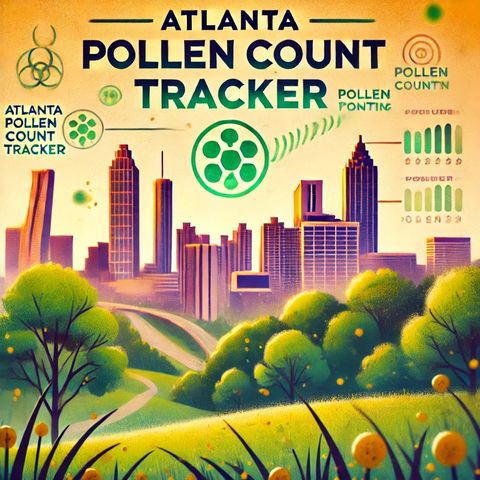Pollen Count for Atlanta, GA on 11-08-2024

Download and listen anywhere
Download your favorite episodes and enjoy them, wherever you are! Sign up or log in now to access offline listening.
Pollen Count for Atlanta, GA on 11-08-2024
This is an automatically generated transcript. Please note that complete accuracy is not guaranteed.
Description
Atlanta, GA, known for its vibrant seasons and lush greenery, experiences fluctuating pollen levels throughout the year. As we look at today's forecast for November 8, 2024, understanding the anticipated...
show moreToday, the pollen count in Atlanta is projected to be at a moderate level. During this time of year, pollen primarily comes from grass and weed species, as most trees have already completed their pollination cycle in the spring. The cooler autumn weather often causes a dip in pollen levels compared to the peak season of spring, but some allergens still linger in the air.
Specific weeds contributing to the pollen count today include ragweed and nettle. Ragweed, a common allergen, can be particularly troublesome for allergy sufferers. It tends to thrive in late summer and fall, producing significant amounts of pollen until the first frost. Nettle pollen, though less prevalent, is also present and can contribute to allergy symptoms for sensitive individuals.
Grass pollen is something to watch for as well, although it is generally less intense in the fall than in the spring and early summer. Today's moderate level suggests those who are allergic might experience mild symptoms such as sneezing, nasal congestion, or itchy eyes.
Weather conditions play a crucial role in pollen dispersion. Today's forecast indicates mild temperatures and a slight breeze, which can help spread pollen throughout the area. The absence of rain means pollen will not be washed out of the air, potentially prolonging exposure for those outdoors.
To manage allergy symptoms, residents are advised to keep windows closed to prevent indoor accumulation of pollen. Using air filters and regularly vacuuming with a HEPA filter can help reduce indoor allergens. When spending time outside, especially for prolonged periods, wearing sunglasses and a hat can help minimize pollen contact with the eyes and hair.
It's also helpful to monitor the local news or dedicated weather services for updates on pollen levels, as these can fluctuate with changing weather conditions. Over-the-counter antihistamines may provide relief for those experiencing symptoms, but consulting with a healthcare provider is recommended for persistent or severe allergy issues.
In conclusion, while the pollen levels in Atlanta today are not at their peak, they remain substantial enough to affect those with sensitivities. By staying informed and taking preventive measures, residents can better manage their allergies and enjoy the crisp autumn air.
Information
| Author | QP-5 |
| Organization | William Corbin |
| Website | - |
| Tags |
Copyright 2024 - Spreaker Inc. an iHeartMedia Company
